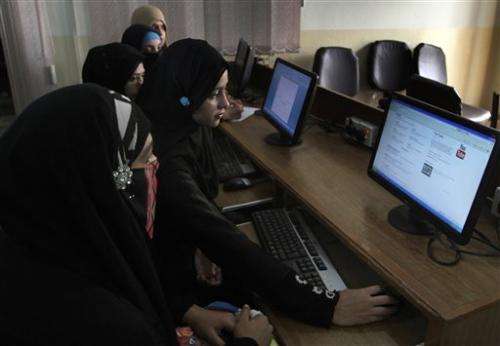Free YouTube! Pakistan ban faces court action

ToffeeTV has hit an unexpected snag. The Internet startup depended on YouTube to promote "Hokey-Pokey," ''The Umm Nyum Nyum Song" and other language-teaching clips it produces for children, but the video-sharing website has been banned in Pakistan for nearly a year.
The measure was imposed to block videos that Muslims took as insulting and blasphemous. But the unintended consequence has been frustration for many companies, educators and students. A petition to end Internet censorship is before a Pakistani court, and a debate has been rekindled over how to reconcile the right to a free flow of information with a widespread public sentiment that Islam needs special protections.
ToffeeTV has had to save its clips on its own servers and delay the rollout of its apps, says company co-founder Rabia Garib. "It threw us off our feet," she said. "We're off schedule by about eight months."
While the tech-savvy have ways to get around the ban, the vast majority of Pakistanis who try to view YouTube get this: "Surf Safely! ... The site you are trying to access contains content that is prohibited for viewership from within Pakistan."
The made-in-America trailer for "Innocence of Muslims," the movie of which has never reached cinemas, provoked uproar throughout the Muslim world, and several U.S. diplomatic missions were targeted. In Pakistan, clashes between police and protesters left 19 people dead.
YouTube as well as Facebook were initially blocked although the government soon exempted Facebook, saying it removed the offensive material. At the time, U.S. President Barack Obama's administration asked Google, YouTube's parent, to take down the video. But the company refused, saying the trailer didn't violate its content standards.
The only other countries that block YouTube are Tajikistan, China and Iran, according to Google's transparency report that tracks restrictions of its products. Another 56 countries have localized versions of YouTube that allow for tailoring content to local standards.
Pakistan, a nation of roughly 180 million, has a democratically elected government and a legal system inherited from its former British rulers. But that system also contains significant religious strictures, and disputes over religion frequently end in bloodshed. So at the time the YouTube ban was imposed, many saw it as a necessary calming measure.
Now an advocacy group called Bytes for All is petitioning the Lahore High Court to order an end to all Internet censorship.
Muzzling YouTube "could lead to the opening up of an entire Pandora's box of moral policing and dictatorial controls despite the democracy being in place," said Furhan Hussain of Bytes for All.
At the organization's Islamabad offices, activists say the YouTube case is just the latest example. Over the years the government has periodically banned Facebook, Twitter and Tumblr, but the YouTube ban has lasted the longest.
It can be circumvented via VPNs, virtual private networks that mask the user's computer but are prone to viruses and slow the Internet connection.
These proxies are too cumbersome for his staff to deal with, says Jawwad Ahmed Farid, founder and CEO of Karachi-based Alchemy Technologies, which does risk-management training for financial professionals.
It posts short videos of its classes on YouTube to attract business, but uploads fewer of them following the ban, and the volume of Pakistani customers referred through YouTube has fallen, Farid said. "My team finds it very difficult to work with all the proxies in place. It certainly slows it down a bit," he said.
Sidra Qasim is co-CEO of HOMETOWN, a Lahore-based company that helps leather workers to market products such as shoes and belts online. It used YouTube to reach customers and also to teach the workers new techniques. "Now that training part is stopped totally," she said.
A committee of officials from various ministries is looking for solutions and will make the decision on whether to unblock YouTube. But experts aren't sure a technical solution even exists, and Bytes for All and others say that even if the government comes up with a filtering mechanism, they will continue to resist it as censorship.
Kamran Ali, a spokesman for the Ministry of Internet Technology, acknowledged that the ban can be a hardship but said the government must weigh freedom of information against offending the public.
"It's a Muslim country, and this video clearly violates the religious sentiments of the people of Pakistan," he said.
At Air University in Islamabad, some students supported a government-imposed filter. "If they are able to control this blasphemous material that would be a good step," said Waqar ur-Rehman, 21.
But they recognized the difficulty of actually coming up with a system, and some argued against any restrictions, if only because they could be evaded.
"I think the ban shouldn't have been there. It (the movie) hurt a lot of religious sentiments, mine as well, but it was not the right way to do it, because there are so many ways to go around it," said Palwasha Khursheed, who studies electrical engineering.
Hafiz Hussain Ahmed, a Muslim cleric, acknowledged the ban was porous, and said Pakistan was missing an opportunity to use technology such as YouTube to educate people about Islam.
He urged the government to lift the ban, but only after installing filters, saying, "We must not allow anyone to attack our cultural values."
One solution would be a localized version of YouTube for Pakistan. But Google would need immunity from prosecution for any offending content, and Pakistani law so far doesn't allow for such an arrangement.
"It is Google's goal to offer local versions of YouTube to more places worldwide, but it takes time," said Google in a statement to The Associated Press in request for comment about the court case. "The localization process can be lengthy as we research laws and build relationships with local content creators."
More information
© 2013 The Associated Press. All rights reserved.


















